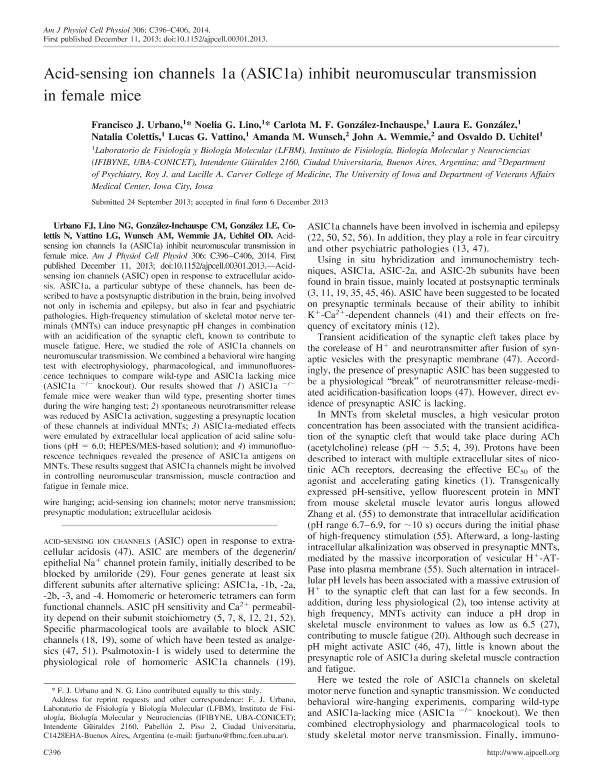Artículo
Acid-sensing ion channels 1a (ASIC1a) inhibit neuromuscular transmission in female mice
Urbano Suarez, Francisco Jose ; Lino, Noelia Gisele
; Lino, Noelia Gisele ; González Inchauspe, Carlota María Fabiola
; González Inchauspe, Carlota María Fabiola ; Gonzalez, Laura Elisabeth
; Gonzalez, Laura Elisabeth ; Colettis, Natalia Claudia
; Colettis, Natalia Claudia ; Vattino, Lucas Gabriel
; Vattino, Lucas Gabriel ; Wunsch, Amanda M.; Wemmie, John A.; Uchitel, Osvaldo Daniel
; Wunsch, Amanda M.; Wemmie, John A.; Uchitel, Osvaldo Daniel
 ; Lino, Noelia Gisele
; Lino, Noelia Gisele ; González Inchauspe, Carlota María Fabiola
; González Inchauspe, Carlota María Fabiola ; Gonzalez, Laura Elisabeth
; Gonzalez, Laura Elisabeth ; Colettis, Natalia Claudia
; Colettis, Natalia Claudia ; Vattino, Lucas Gabriel
; Vattino, Lucas Gabriel ; Wunsch, Amanda M.; Wemmie, John A.; Uchitel, Osvaldo Daniel
; Wunsch, Amanda M.; Wemmie, John A.; Uchitel, Osvaldo Daniel
Fecha de publicación:
02/2014
Editorial:
American Physiological Society
Revista:
American Journal of Physiology-cell Physiology
ISSN:
0363-6143
Idioma:
Inglés
Tipo de recurso:
Artículo publicado
Clasificación temática:
Resumen
Acid-sensing ion channels (ASIC) open in response to extracellular acidosis. ASIC1a, a particular subtype of these channels, has been described to have a postsynaptic distribution in the brain, being involved not only in ischemia and epilepsy, but also in fear and psychiatric pathologies. High-frequency stimulation of skeletal motor nerve terminals (MNTs) can induce presynaptic pH changes in combination with an acidification of the synaptic cleft, known to contribute to muscle fatigue. Here, we studied the role of ASIC1a channels on neuromuscular transmission. We combined a behavioral wire hanging test with electrophysiology, pharmacological, and immunofluorescence techniques to compare wild-type and ASIC1a lacking mice (ASIC1a −/− knockout). Our results showed that 1) ASIC1a −/− female mice were weaker than wild type, presenting shorter times during the wire hanging test; 2) spontaneous neurotransmitter release was reduced by ASIC1a activation, suggesting a presynaptic location of these channels at individual MNTs; 3) ASIC1a-mediated effects were emulated by extracellular local application of acid saline solutions (pH = 6.0; HEPES/MES-based solution); and 4) immunofluorescence techniques revealed the presence of ASIC1a antigens on MNTs. These results suggest that ASIC1a channels might be involved in controlling neuromuscular transmission, muscle contraction and fatigue in female mice.
Archivos asociados
Licencia
Identificadores
Colecciones
Articulos(IFIBYNE)
Articulos de INST.DE FISIOL., BIOL.MOLECULAR Y NEUROCIENCIAS
Articulos de INST.DE FISIOL., BIOL.MOLECULAR Y NEUROCIENCIAS
Citación
Urbano Suarez, Francisco Jose; Lino, Noelia Gisele; González Inchauspe, Carlota María Fabiola; Gonzalez, Laura Elisabeth; Colettis, Natalia Claudia; et al.; Acid-sensing ion channels 1a (ASIC1a) inhibit neuromuscular transmission in female mice; American Physiological Society; American Journal of Physiology-cell Physiology; 306; 4; 2-2014; 396-406
Compartir
Altmétricas



